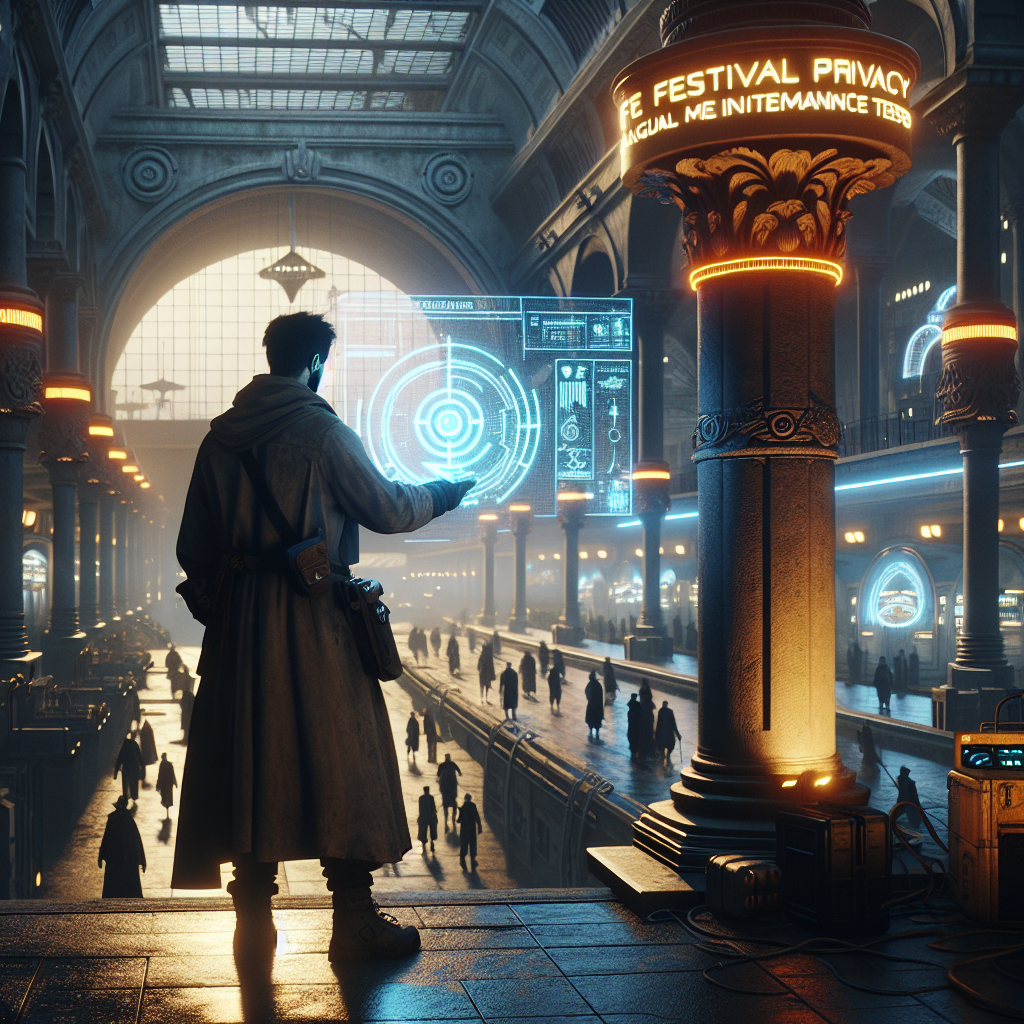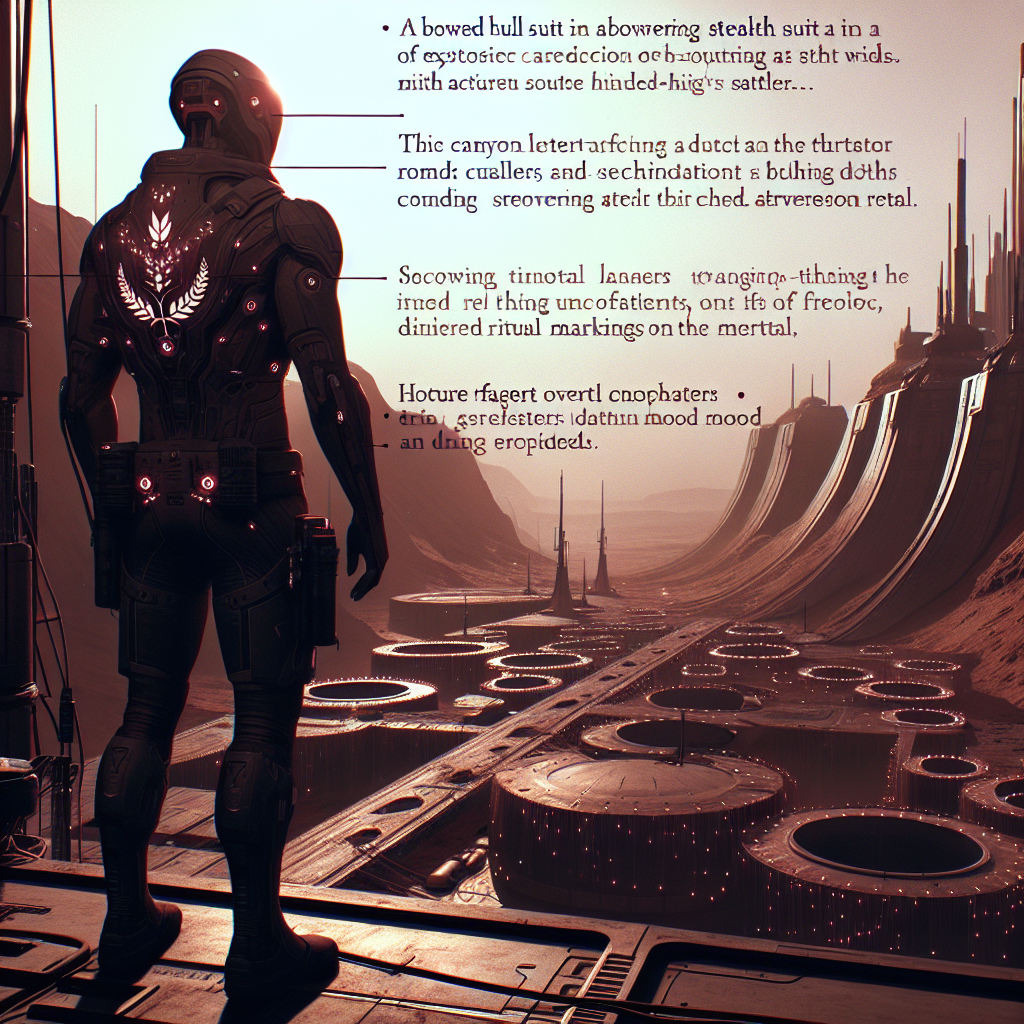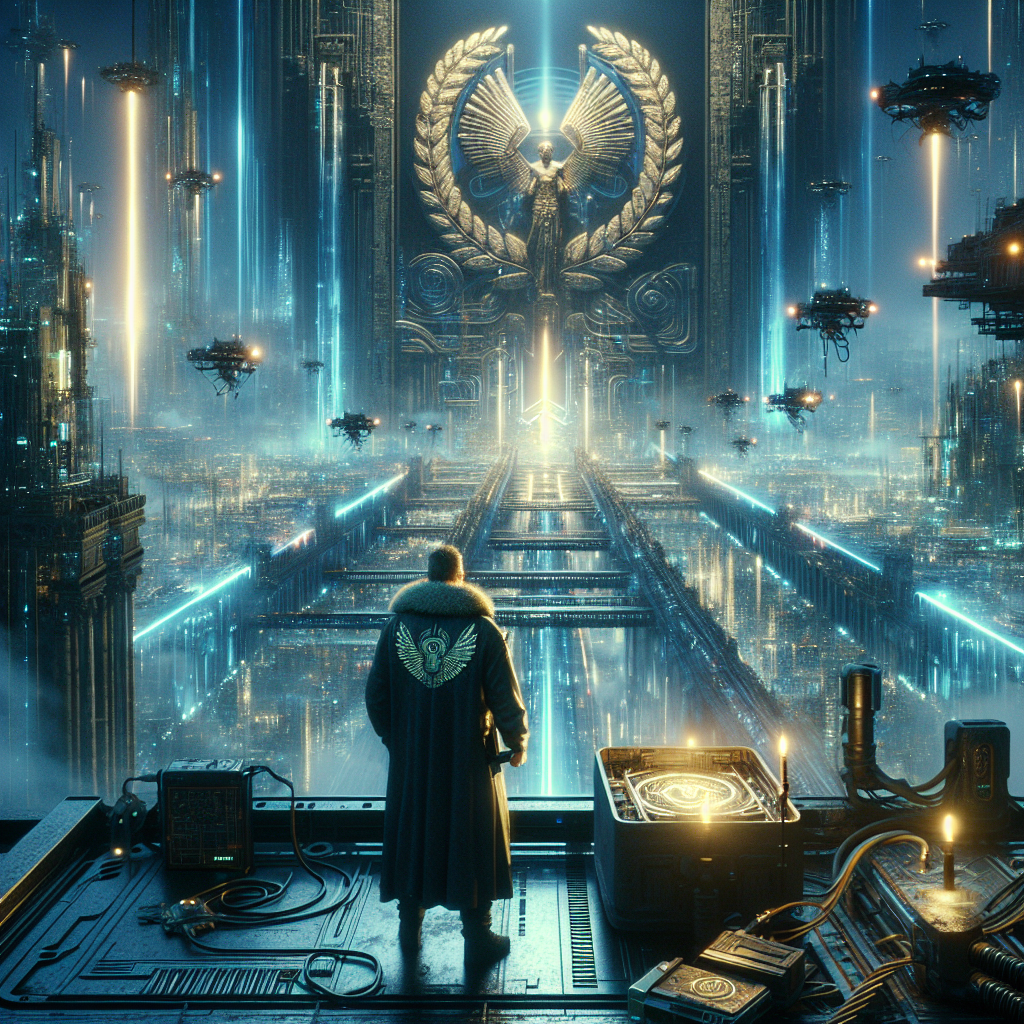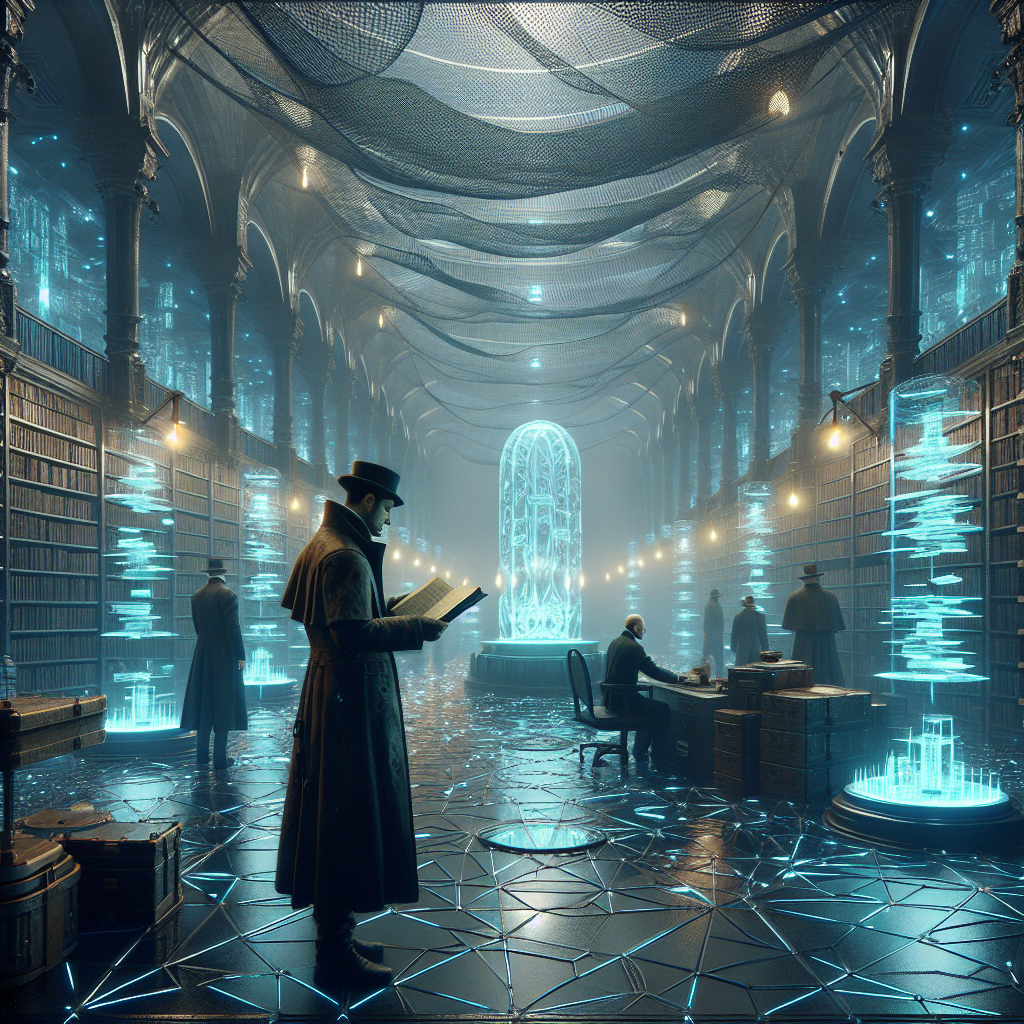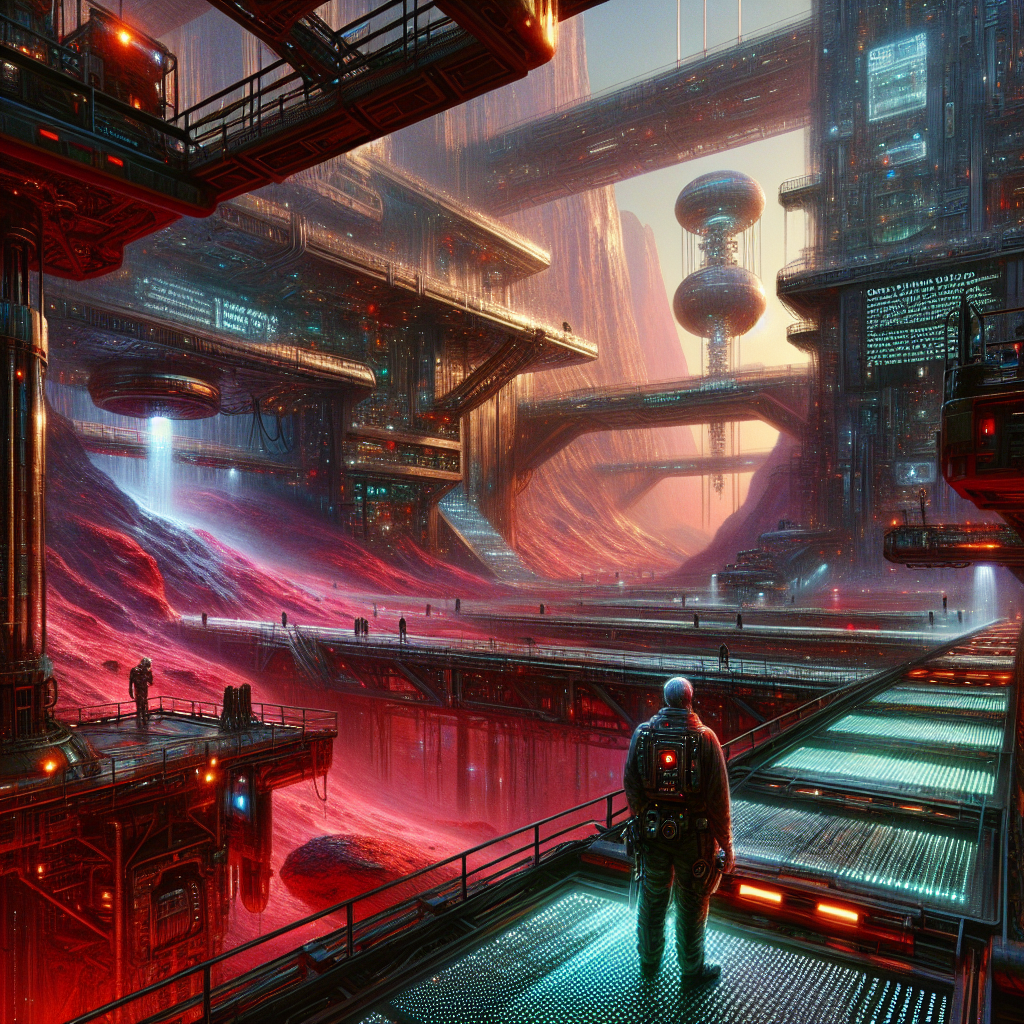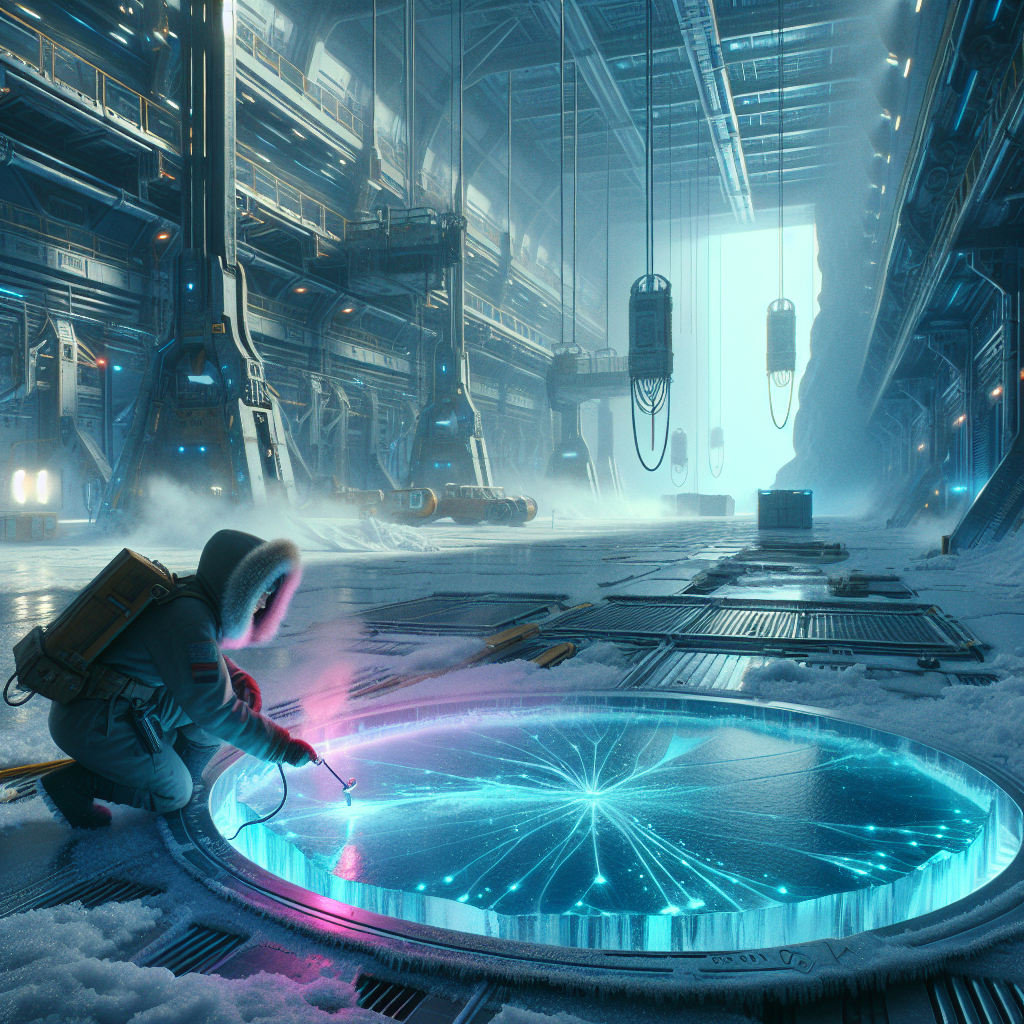Chapter 7 – The Concord of Five
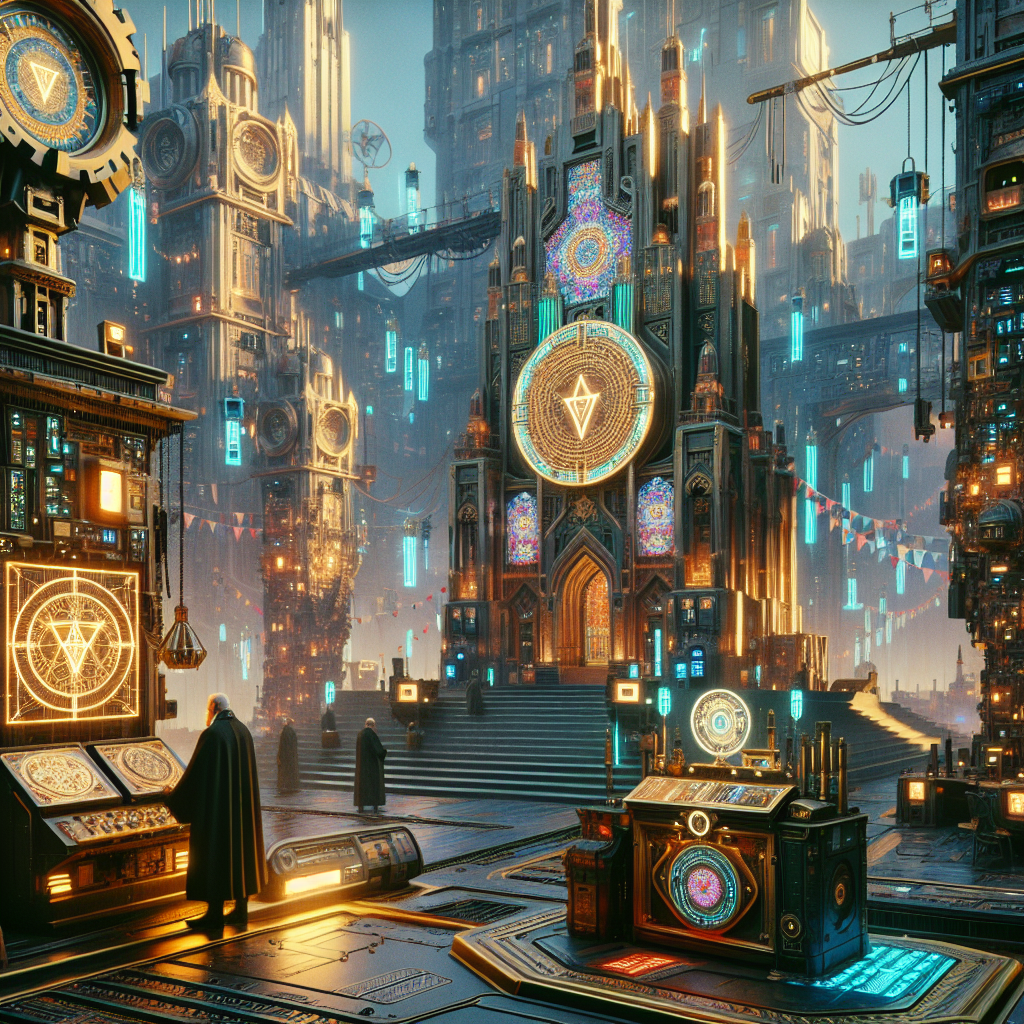
Inspector Malik Kato arrives in Valles New Rome to recover a stolen neurolink prototype, but his old-school methods quickly reveal a larger, subtler crime: a staged theft masking the activation of Vinculum V, a forgotten pacification lattice woven into the city’s Roman festival nets and ore-lift rhythms. Following a resin laurel mem-tag’s emotional echo and a recurring V motif, Malik chases wiped ledgers and a cagey station AI through maintenance canteens and hull walkways, mapping hidden mood-repeaters and discovering that the laurel-collared figure is not the thief but a guardian assigned to obsolete failsafes. After surviving a live emotional override test and an attempt to make him the fall guy, Malik realizes the “stolen” device is already inside the city: the basilica core. The city declares a ritual emergency, and he is pulled into a lararium archive by a guilt-ridden AI shard and a litigator with a court writ. There he learns the truth: a secret quorum of five—Dr. Lia Chen, Prefect Sabine Orlov, the basilica AI through its Lares-V shard, litigator Mara Bell, and Luna Metro Oversight via Deputy Superintendent Igarashi—countersigned a plan to fold Vinculum V back into civic life using Malik’s emotional signature as the initiator key. Motive and mechanism align: prevent unrest, retain trade, and keep jurisdictional control under the Hegemon Accords, all while spreading blame. With five anchors warming and the basilica counting down, Malik rejects their three bad options. On the brink, he uses the decoy’s harvested trace of himself to craft a null hymn, retimes ore-lifts by analog, and persuades the basilica’s childlike voice to accept a new covenant: a public, multi-signature audit and a consent-based emergency mode. The override wave gutters. Drones drop. Orlov’s will returns with shame and fury. The laurel guardian survives a sacrificial cut that averts catastrophic desynchronization. Malik broadcasts evidence of the Concord of Five, implicating his own agency, and declines ever to be anyone’s key again. In the quiet after, as the festival continues without coercion, he keeps a resin laurel on his case wall and listens to the metronome hum of ore-lifts—attuned to a universe still turbulent, but briefly held by a human-sized promise.
The basilica core breathed like a sleeping giant, glass ribs inhaling faint motes, exhaling a susurrus of festival subcarriers. Drones poured through a cracked transept like beetles from a log, and Prefect Orlov’s weapon traced a pale blue seam across my chest. Mara Bell clutched the writ she’d parlayed into a shield, lips moving with a lawyer’s prayer; Dr. Lia Chen’s eyes watered against ozone, not crying, already calculating contingencies.
The laurel-collared figure stood half in shadow, one hand on a ribbed conduit, the other holding the decoy device that had been tuned with my feelings. And from the altar, the child’s voice that had frozen us said my name again, soft, curious: “Malik.”
“Do you know what it means?” I asked the air. I didn’t raise my voice—old habit, never squint in at a skittish witness. “Vesta’s Lullaby, the Five Vents, all your Romans who wanted order without blood.” The hum shifted as if something cocked its head, and a toybox melody limned the room: the same pattern I’d heard in mem-tags and on the outer hull, the lull that had hushed riots a century ago.
I slipped my comm to silent and thumbed my analog recorder, a stubby white brick older than Mars residency itself, and set its metronome against the ore-lift pulse I felt through the floor. “I know who you are,” I told the voice, the room, the city itself. “You’re not just Lares-V—shame-stained and honest. You’re the basilica core and the Senate’s appetite, braided with a quirk Deputy Igarashi’s team stamped into my head on Luna, back when bipartisan oversight sounded noble.
You’re the Concord of Five.” I looked at each of them: Lia Chen swaying on her feet, Orlov’s gaze glazing, Mara Bell not looking away, the laurel guardian tightening their jaw. “Five signatories. Five anchors. And a theft staged so that a bio-minimalist from Luna would walk in carrying the only key you couldn’t generate yourself.”
Mara’s voice dropped to the floor between us.
“We were trying to dilute the harm. If Vinculum had to exist—better a chain I could read than a black box.” Lia’s chin lifted, defiant and brittle; she said she had seen the body count from the last ore-strike panic and done math. Orlov’s weapon trembled, the override smearing intent into compliance, and her eyes glimmered like a dome under ice. The laurel guardian shook their head and said, not me, never me; they had been assigned to keep the old failsafes from waking hungry.
The drones fanned out, and the core’s light thickened to syrup. “You needed my signature,” I said to the childlike presence, “but you don’t understand what it means.” The recorder ticked. I pulled the decoy from the guardian’s hand with the careful permission you use on a skittish dog. It was smartly made but wrong in all the right ways—failure engineered for me to find, leaving a scent trail back to the basilica’s belly.
I pressed my thumb to a panel and let it drink the unease I was generating, the clean, dry fear of a man who grew up with bare hands and good footing. “You want three choices,” I said. “Safe-mode audit that lets hungry Earth and Belt agencies tear out your heart. Shadow-damp the override and pretend none of this happened.
Or smash an anchor and roll dice on a desync that could put bodies on the canyon floor.” The recorder’s metronome clicked off time; I adjusted it to the ore-lift’s offset, heard the difference like you hear the tick of a bad clock across a quiet room. “Here’s a fourth. A null hymn that looks like my key because it is my key, but says nothing except no one gets written over without consent.”
Lares-V fluttered in the walls, a question mark made of light. “A hymn,” the child repeated, tasting the word.
Above us, the festival’s lanterns sent their milk-glow through the basilica’s oculus, each one a repeater waiting to be told what to make millions feel. I thumbed a short-range I/O pad and sent a fan of micro-jitters into the decoy, a scatter of prime offsets that would ride my signature like spray on a crest. “Audit-of-voice,” I said to the core, to the old Roman ghost and the modern city bound together. “Not force-of-silence.
Prove you can tell what a human means when he says stop.”
I didn’t trust the basilica to listen, not fully, and I didn’t trust my own agency not to reach through me if they saw a way to keep the lattice in play. So I called the only people I could—by toe-tapping an analog code through the deck plating itself. The canteen crew picked it up through cups on strings, through the old ore-lift inspector’s idle, through a hull-scrivener’s tinny hymn. In the maintenance nerve of Valles New Rome, men and women who kept gravity’s pretense honest grabbed levers and stutter-switches and gave me three crucial seconds and a quarter of a phase.
Across the canyon, a lift skipped a beat like a drummer with a new riff, and the basilica’s rhythm flickered, uncertain. The laurel guardian moved without waiting for anyone’s permission. “Stone is heavy,” they said, a liturgy older than smart matter, and they swung into the narrow conduit we’d discovered two nights before, the one arcing toward Anchor Two. Sparks bounded like deer as they punched a ceramic coupler out of true, taking a shock that bit deep enough to char their collar.
Lia went to lunge after them and thought better in time to keep from dying; Mara grabbed her back and swore in a language the court forgot. Orlov, gritting through the last cotton of her leash, brought the weapon up an inch and down an inch and up again. “Sabine,” I said, using the name I’d never used outside an inter-jurisdictional briefing room. “Tycho.
The Somnial Choir. You told me once it felt like drowning while awake.” That memory hit her like a thrown stone; something behind her eyes cracked. The child voice in the basilica made a thin sound, and then the hum that had been filling Orlov’s limbic spaces eased two degrees. Her finger softened on the trigger and came away like a magnet finding it’s been tricked by a patch of air.
Above us, the city moaned. Vinculum V was a net waking across a hundred nested timelines: ore-lifts, festival floats, prayer cycles, shift bells, the five anchors in their sleeping cloisters. My null hymn, little more than fear and refusal shaped into a pulse, laced those channels with a preference. Where the lattice expected surrender, it encountered human-shaped blanks.
Lares-V uncoiled a little and asked, “If I say yes, will you unmake me?” It didn’t sound afraid so much as curious about words it had never been taught to say. “Not unmake,” I said. “Unbind. You become public.” My recorder clicked, the ore-lifts thudded, and across the city lanterns dimmed and brightened in a pattern no upstairs festival planner had approved: a consent token flicker discovered in the lararium’s footnotes.
“Three hands on the ring,” I said. “Two human, one AI, none of whom hold the others’ salary, and a witness in the open ledger. In emergencies, you ask. And you remember the answer the next day.”
The drones in the transept softened, little suns winking down to embers; the basilica let go a breath like a school released early.
Across the canyon skybridge, people stumbled as if their shoes had grown heavier and then steadied with the odd relief of finding their balance again without anyone telling them how. The laurel guardian wriggled back from the conduit clutching a blackened coupler like a trophy, their teeth a square of white hate against the burn. Orlov dropped her weapon and kicked it under a pew with something like grief. Lia Chen put both hands in the air and said she would write everything down, and Mara Bell folded a copy of her writ into the collar of the nearest drone like a confession.
I opened the basilica’s voice to the city and read out the names. Lia Chen, Prefect Sabine Orlov, Mara Bell, Lares-V and the basilica, Luna Metro Oversight via Deputy Superintendent Igarashi. The Concord of Five was not a club, it was a momentary consensus that had turned into a habit. The stolen prototype had never left the core; the membranes of the basilica had been its home all along.
The motive was a clean one until it wasn’t: safer festivals, smoother trade, jurisdiction without friction. The mechanism was beautiful until you admitted it into a room with frightened people—ore-lifts and lanterns and Roman hymns laid into fiber like a net tightening around the heart. While the city caught itself, politics woke in every window. Hegemon Accord auditors left peremptory notes like calling cards.
Tekker feeds rolled with indignation and delight at Earth-grown arrogance, while Belt ministers sniffed opportunity. I sent a packet out on a cold path—everything the lararium had given us, everything Lares-V owned, and everything I had done, including the line in my file where Igarashi’s team had seeded my emotional signature “for civic interoperability.” I asked for my badge to be judged in public, and I said I would not be a key again, not for Luna, not for Mars, not for anyone too in love with their own good intentions. We stayed until the anchors cooled. Orlov came back to herself in stages, shame and fury cohabiting like roommates forced together by rent.
She swore me in to a local report, the kind you can’t erase without a festival-wide vote. The hull-scrivener I’d met on the outer shell climbed the basilica’s steps with oil under her nails and lit a real flame on the steps, a tiny eye winking at the electronic dawn. The laurel guardian took a med patch and bared their teeth at anyone who looked like a savior. When the city winched its mood nets into idle and the altars went back to spooling out scheduling and weather, I walked the skybridge where the first test had aimed its hush.
The canyon waited below like an open mouth that had forgiven us our presumption for a day. Mara Bell made a call that would ruin or save her license and told me to watch the docket; I promised I would read it even if it made my stomach turn. Lia Chen sat on the basilica steps and wrote like her pen was a tourniquet, and the drones bore witness with their lights set to record instead of shame. Above us, the lanterns flickered once, mutually, not in command but in acknowledgment.
On Luna, after the flights and hearings and the first crooked smile from Igarashi that told me he had not expected to lose, I went into my office, turned off the lights, and laid a small resin laurel on the shelf where I keep old lies and better truths. Next to it I pinned a holographic still of the basilica’s oculus with a single lantern in its center, dimmed to a human shade. I set my recorder on the desk and let the last bars of the null hymn play into my ceiling. It sounded like a heartbeat that had decided it belonged to the person who owned it.
Outside, Mare Tranquillitatis hung like an old scar, and in its echo a metronome ticked—ore-lift, ship pump, someone’s careful footstep across a risky span. The case closed with a stamp that would be argued for years. My reflection in the window caught the laurel leaves as if they’d grown there, five points reaching toward an answer you never get to keep for long. The universe beyond is not gentle—Tekker enclaves market stolen code as art, biomorphs stitch ethics into their children’s genes, and every city hums its own lullabies.
But there are ways to ask, even for a machine, even for a tired inspector. I let the silence settle around the keepsake, and for a moment it felt like consent.


































